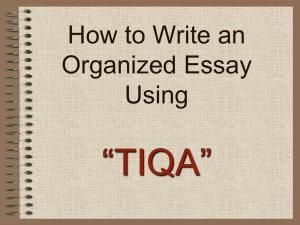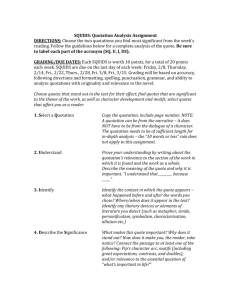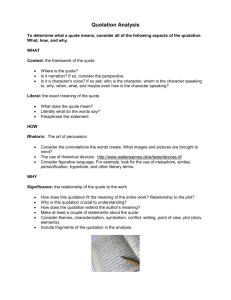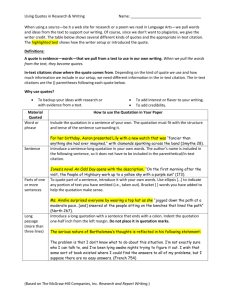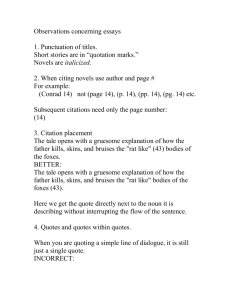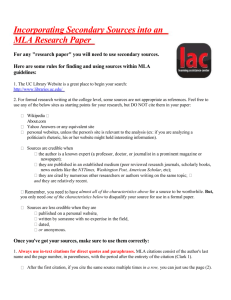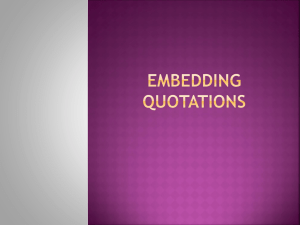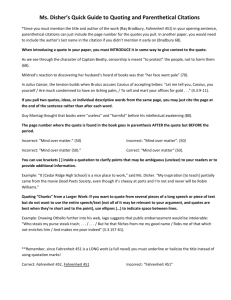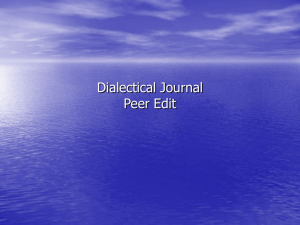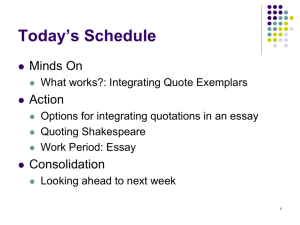Integrating Quotations into Sentences
advertisement
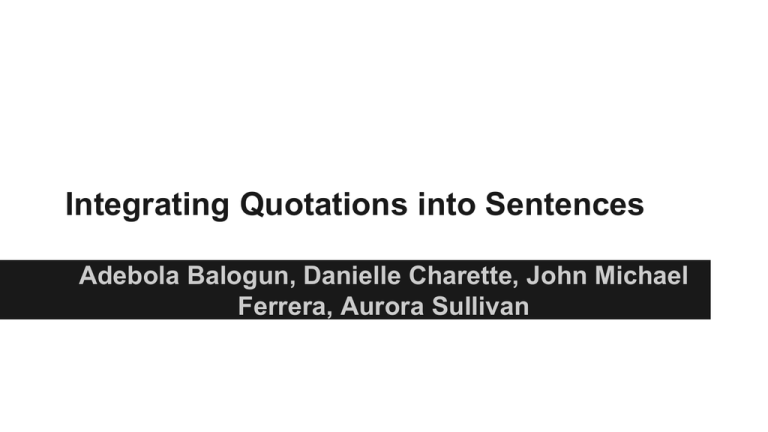
Integrating Quotations into Sentences
Adebola Balogun, Danielle Charette, John Michael
Ferrera, Aurora Sullivan
Adding Integrating Quotes
What is an integrated quotation?
● An integrated quotation is a direct quotation from a source you are
working with that is put into your writing.
● Your paper develops an argument about what the author of the text
is doing and how the text "works." You use quotations to support
this argument; that is, you select, present, and discuss material
from the text specifically to "prove" your point—to make your case.
Adding Integrating Quotes
Continued...
● Don't quote to "tell the story" or otherwise convey basic information
about the text; assume the reader understands the text. Don't quote
just for the sake of quoting or just to fill up space.
● Keep in mind that quotes DO NOT speak for themselves. Although
the meaning of the quote may be obvious to you, its significance
must be explained to the reader.
Patterns to Incorporate Quotations into
Sentences
Try not to quote an entire sentence!
Use one of the 3 patterns below:
1. Add an introductory phrase before you quote.
● Ex. Gatsby is not to be regarded as a personal failure. [argument sentence]
"Gatsby turned out all right at the end" (176), according to Nick.
2. Add your own assertion, plus a colon before you quote.
● Ex. Fitzgerald gives Nick a muted tribute to the hero: "Gatsby turned out all
right at the end" (176).
3. Add your own assertion, plus quoted material.
● Ex. For Nick, who remarks that Gatsby "turned out all right" (176), the hero
deserves respect but perhaps does not inspire great admiration.
http://writing.wisc.edu/Handbook/QuoLitIncorporating.html
Use Signal Phrases to Incorporate Quotes
Def: Is a phrase, clause, or even sentence which leads into a quotation or statistic. These generally include the speaker/author’s
name and some justification for using him or her as an expert in this context; it may also help establish the context for the
quotation.
●
An example: Chancellor Chase observed that "The Army is . . .."
●
According to Frito-Lay research, women snack only 14 percent . . .
●
The candidate insisted that the tariff must be reduced to a "competitive basis" and taxes . .
●
Undernourished children have long been India’s scourge--“a national shame,”in the words of its prime minister . .
..
"If we mention the author's name in the text in a signal phrase ('According to Richard Lanham . . .'), then the parenthetical citation
includes the page number only (18). If we use more than one work by an author, and we have identified his or her name in the
text, our parenthetical citation must include a short title of the work cited and a page number (Style
http://grammar.about.com/od/rs/g/signalphrase.htm
Notice Punctuation!
● There are only two punctuation marks used to introduce quotations:
the comma (,) and the colon (:)
● If there are no author’s name and page number in the parentheses
the commas and periods go inside the final quotation mark (“like
this.”)
● Question marks and exclamation points go outside of the final
quotation mark if the punctuation mark is part of your sentence,
question or exclamation (“like this”?). Those marks go inside the
final quotation mark if they are part of the writers question or
exclamation (“like this!”).
http://www2.ivcc.edu/rambo/eng1001/quotes.htm
Three Types of Quote Integration:
1. Begin with explanation: Even though Mrs. Wilmot appears to love her children to the rest of
the world, “when her children were present, she always felt the center of her heart go hard”
(120).
2. Begin with quote: “She always felt the center of her heart go hard” demonstrates how Mrs.
Wilmot appears a loving mother to the rest of the world, while inwardly feeling little for her
children (120).
3. Quote is inserted in the middle: Mrs. Wilmot “always felt the center of heart go hard” when her
children were present, but to the rest of the world, she appears to be a loving mother.
http://www.myteacherpages.com/webpages/SKearney/files/Integrating_Quotes[2].pdf
Video!
https://www.youtube.com/watch?v=eLNlyLala-k
